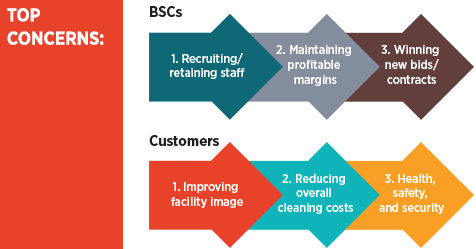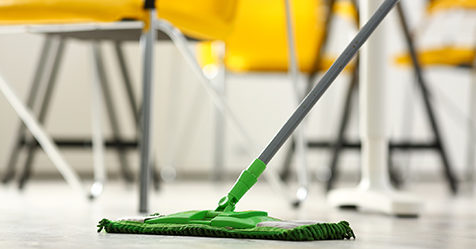Although the federal minimum wage rate hasn’t been raised since 2009, 2019 is shaping up to be a banner year for state-based increases.
Nineteen states approved increases that kicked in during the first week of the year, and in July 2019, new rates are scheduled to take effect in Oregon and Washington, D.C.; even Michigan lawmakers recently signed off on a wage increase that’s slated for the coming weeks.
Factoring in new minimum wage requirements while maintaining a previously set budget can be a challenging prospect—particularly if a commercial cleaning company operates in multiple states, according to Astrit Gorana, chief operating officer for facility management firm Planned Companies.
“For a long time, minimum wage was only changing in very small increments, and the changes were not as often,” Gorana says. But now, the New Jersey-headquartered janitorial service provider is facing wage increases in several of the regions it services, including New York, New Jersey, California, and Washington, D.C. “Now every state has different regulations—and you really have to be on your game to make sure you’re in compliance with the labor laws and regulations.”
Prepare Your Operation
Just keeping track of wage adjustments in various locations can be a significant undertaking. California, for example, passed legislation in 2016 to raise the minimum wage to US$15 an hour by 2022 for organizations with 26 or more employees. Soon after, a number of individual cities began announcing plans to implement the increase earlier.
“When we caught wind the state was adjusting it and San Jose [planned to do the same by 2019], I started checking other areas by pulling reports from our payroll processor and made a giant spreadsheet,” says Matt Sole, president of Anago of the Bay Area, a franchisee operation based in Northern California. “All the different cities had a slightly different timeline; some were accelerated from California, and some were no different.”
To help manage situations like this, accountants, payroll, and external human resources service providers can often guide cleaning companies in the process of enacting mandatory minimum wage increases.
Strategies to Offset Increases
Higher hourly rates will, in many cases, result in cleaning providers having to raise prices. For companies dealing with varying wage averages, increasing labor supply costs, and other flexible elements, managing minimum wage increases can have a huge effect on client relationships, profitability, and a number of other dynamics.
“Our industry is a low-margin industry; we can’t just absorb a 7 to 8 percent increase,” says Michael Diamond, managing partner at AffinEco, LLC, which offers commercial cleaning services in New York, New Jersey, and New England. “There’s not enough money in existing pricing models. Some customers choose to accept it. Sometimes they want to go to bid, and sometimes we lose work or gain it in the process; but ultimately, we need to pass it through.”
To help minimize the impact of wage increases, providers may want to consider utilizing some of the following approaches:
Discuss upcoming changes as early as possible. To ensure clients are prepared for any influence a wage increase will have on pricing, AffinEco brings up impending regulations potentially six months in advance of the coming year.
“There’s not too much legislation that passes on short notice; we know something is coming and start talking about it if it’s something we need to value engineer,” Diamond says. “For example, if there’s a vote in Connecticut this summer about minimum wage and it looks like it’s likely to pass, I’ll start talking with customers because they have to set their budgets—and starting in August and September have to be thinking about it.”
Re-examine service schedules. If a client is still concerned about rising fees even after it’s made clear the increase is due to rising local costs, it may be time to re-examine the services you provide.
“You can reduce vacuuming frequency from five days a week to three, and it saves time and allows us to pay workers more, but possibly reduce a crew from 10 [employees] to 9,” Diamond says. “On the other hand, if we clean less, and occupants get sick more, and there’s more absenteeism, are we really helping customers have a more productive office space? It’s a conversation of whether scope and budget take priority over employee health.”
Estimate at least a moderate increase in budgets. When operators know a new minimum wage requirement is scheduled for the following year, they have time to factor the change into annual contracts. At the same time, folding increases into longer-term arrangements can be trickier.
“[If a state is tying the increase] to inflation, how do you price jobs you’d like to keep for three, five, or 10 years when you don’t know what the minimum wage will be three years from now?” asks Adam Povlitz, president and CEO of Anago Cleaning Systems’ corporate office, which has stake in more than 1,500 franchisee operations across the United States and Canada, including Sole’s Bay Area operation. “That’s one of the bigger hurdles. You can get a forecast of the inflation rate; but what ends up happening [can be] very different.”
You may not know exactly what future increase amounts will be; however, Sole, who helps Anago franchisees in different areas get up and running, says including projected estimates for any potential increases can help prepare providers with meeting financial needs. “We try to stay on top of it,” he says. “That allows us to plan ahead so franchisees can deliver services without going back and asking for price changes because minimum wage keeps changing.”
Find new efficiencies. To show area franchisees how to use machinery that can potentially lower costs by boosting productivity, Sole added a full-time training provider. Teams can also rent an autoscrubber machine from him, or Sole will work with franchisees on financing options so they can purchase machines for regular use.
“You can clean upwards of four times faster with an autoscrubber versus a standard mop—you don’t have to make sure water is replaced every few thousand feet; it’s all internally in the machine,” Sole says. “Normally, you’re at least doubling or tripling your productivity rate by incorporating more advanced machines or tools, [which] helps their bottom line.”
Look for nonlabor-related reductions. If a wage increase ends up being more than anticipated—or a complete surprise—facility service providers may be able to avoid charging a significantly higher price to clients by lessening other expenses across the organization. If a company can increase its supply and equipment buying efficiency by 6 percent, for instance, it may only need to pass on 4 percent of a 10 percent wage increase to its clients, according to Gorana.
“It’s a difficult conversation to continue to ask for a price adjustment, especially in New York or D.C., where each year for the last three or four there’s been significant [increases],” he says. “If you can buy products a little cheaper or are in a long-standing contract and know you’re not going to need equipment for two to three years because you just bought it, you can adjust line items for the budget so you can take some of the burden off the client.”
Living in Close Quarters
In addition to client management, higher minimum wage requirements can also alter recruiting efforts—the No. 1 issue for building service contractors, according to CMM’s 2018 BSC/Contract Cleaning Benchmarking Survey. For example, commercial cleaning providers may find wage changes altering the available talent pool in areas that didn’t even experience a pay bump.
“In New Jersey [areas near the New York border], recruiting is challenging because minimum wage is [nearly] $9,” Gorana says. “Cleaning professionals are one bus stop or train ride away from making $15 an hour in New York City. It does become challenging for us to be competitive with pricing and New York City’s pay.”
However, now that New Jersey has signed a bill to bring the state’s minimum wage to $15 per hour by 2024, the state has a chance to eventually compete with its neighbor across the bridge—as long as it can keep up.




